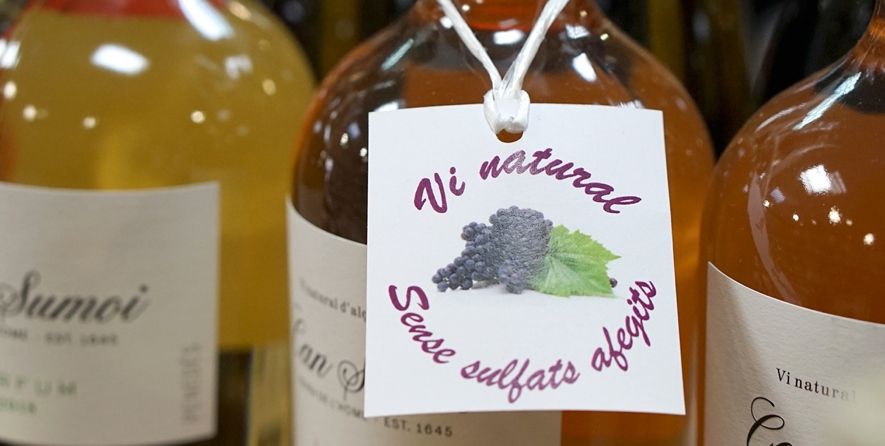It is likely that at some point while enjoying a glass of wine, you have wondered about its origin and flavor. While it’s relevant to consider how sweet or bitter it is, this is a matter of taste. However, for others, the important factor lies in how it was made and how this process makes it different from others on the market.
Oenology, or the art of winemaking, has evolved to such an extent that it prioritizes the notes of the final distillate and has taken on the task of offering an environmentally friendly alternative without compromising quality. This is where sulfite-free wines emerge, an alternative that respects natural processes, both in the cultivation and production of the wine.
At Excellent Cork, we are committed to healthy consumption and are experts in the manufacture of synthetic corks with 100% reusable materials. Therefore, we bring you the following article where we will explain what sulfites are and how they have been used in winemaking.
What are sulfites and why are they avoided?
Sulfites are a sulfur-derived compound that occurs naturally in many foods and beverages and has been used as an additive for its preservative, antioxidant, and antimicrobial qualities.
Although it is currently a common component in meats, wine, and other foods, it is considered critical for health as serious allergies and risks for asthma sufferers have been reported.
In wine, some studies have shown that it is a component that arises naturally during the fermentation process, although there are cases where small additional doses are added. Sulfite-free wines are not clarified or filtered, so the process occurs naturally, making them considered natural wines, as they do not have a chemical agent that accelerates the process. Additionally, they are attributed with a higher alcohol content.
The importance of sulfite-free wines in today’s market
At this point, you might be wondering what the importance of minimal use of this ingredient is; for those who love viticulture, sulfite-free wines are an attractive option if you’re looking for a pure and less processed experience.
Although sulfite in wine will still be present, the fact that no additives are used represents a commitment to authenticity, quality, and health, especially as it aligns with more sustainable and environmentally respectful production.
Benefits of sulfite-free wine
The benefits of sulfite-free wines are evident in health-conscious consumers or those with sensitivities, as studies have shown that affected individuals tend to be sensitive to sulfates, making sulfite-free wines a safe and healthy alternative. Additionally, they tend to be more digestible, contain natural antioxidants, and enhance the wine’s aroma and flavor.
Production process of sulfite-free wines
So, how are they made? It is essential to understand that the idea of sulfite-free wine is to reduce the use of chemicals and focus on ecological and sustainable practices, opting for purely manual and artisanal processes.
Afterward, fermentation relies on native yeasts for fermentation, which are obtained from the grape pomace. Once the wine is made, it is not filtered or clarified, but goes directly into the bottle with a cork.

Types of sulfite-free wines
And do all wines contain sulfites? Traditionally, yes, but not all in the same quantity. It is well known that red wine contains the least amount of added sulfites, while semi-dry and sweet wines contain the most. Here’s more detail.
Sulfite-free red wine
Sulfite-free red wine is the most common and is made with red or black grapes. They have an intense red color and a pronounced fruity flavor.
Sulfite-free white wine
Sulfite-free white wine, on the other hand, is less common and is made with white or green grapes. They have a pale yellow color and a fresh, acidic taste.
Sulfite-free rosé wine
Sulfite-free rosé wine is less conventional than the previous two. It is made from a mix of red and white grapes; it has a soft, fruity flavor and a light pink color.
How to identify and select sulfite-free wines
If the wine contains sulfites, it must be listed on the label, as well as if it does not contain them. Additionally, they are often labeled as “natural, organic, or biodynamic wine.”
Another aspect is to check for certification seals on the label and pay attention to the designation of origin, as some countries use categories that encompass wines without added sulfites.
Frequently asked questions about sulfite-free wines
Do you still have doubts? Don’t worry! Here we answer several frequently asked questions on the subject.
What is the difference between organic wine and sulfite-free wine?
Although both types of wine seek to enhance the natural flavor of the grape, the main difference is that organic wines may contain sulfites in small doses to act as preservatives. On the other hand, sulfite-free wines do not contain added sulfites, being produced entirely naturally and respecting traditional and ecological processes.
Do sulfite-free wines have a shorter shelf life?
Yes, sulfite-free wines tend to have a shorter shelf life compared to wines that contain sulfites. This is due to the lack of chemical preservatives, making them more sensitive to storage conditions. It is essential to store them in optimal conditions of temperature and light to preserve their quality. Despite their shorter shelf life, these wines offer a more authentic flavor and aroma.
How does the absence of sulfites affect the fermentation process?
The absence of sulfites can positively affect the fermentation process, as it allows the natural flavors and colors of the wine to stand out more. However, this process is slower and requires careful handling to prevent oxidation and spoilage. Fermentation is carried out with native yeasts present in the grape, contributing to a unique and more complex flavor profile.
What are the benefits of consuming sulfite-free wines?
Consuming sulfite-free wines can be beneficial for those sensitive to sulfites, as it avoids allergic reactions and respiratory problems. Additionally, these wines are usually more digestible and contain natural antioxidants that may provide health benefits. They also tend to have a stronger, more authentic flavor and aroma due to the absence of chemical preservatives.
How to identify and select sulfite-free wines?
To identify sulfite-free wines, it is important to read the wine’s label. If the wine does not contain added sulfites, this is generally indicated on the label. Additionally, looking for organic, natural, or biodynamic certification seals can be helpful. Paying attention to the designation of origin and the specific categories used by certain countries to indicate the absence of sulfites can also assist in the selection.
Do sulfite-free wines have a higher alcohol content?
Not necessarily. The alcohol content in a wine is not directly related to the presence or absence of sulfites. However, sulfite-free wines may have a more intense and rich flavor, which could give the impression of a higher alcohol content. The alcohol level depends more on the type of grape and the fermentation process than on the addition of sulfites.
Are sulfite-free wines more expensive?
Sulfite-free wines can be more expensive due to the more artisanal and ecological production methods that require more time and care. The absence of chemical preservatives can also increase storage and transportation costs. However, many consumers are willing to pay a higher price for a more natural and higher-quality product.
Are sulfite-free wines suitable for all consumers?
Sulfite-free wines are an excellent option for those looking for a more natural and less processed product, as well as for people with sensitivity to sulfites. However, it is important to keep in mind that the lack of sulfites may make these wines less stable and more prone to changes in flavor and quality if not stored properly.
Why do some sulfite-free wines have more varied flavors?
The absence of sulfites allows the natural flavors and aromas of the grapes to fully develop during the fermentation process. This can result in wines with more complex and varied flavor profiles, as they are not masked by chemical preservatives. Additionally, the use of native yeasts contributes to a greater diversity of flavors.
Is it necessary to drink sulfite-free wines quickly after opening them?
Yes, due to the lack of preservatives, sulfite-free wines should be consumed quickly after opening the bottle to avoid oxidation and loss of quality. It is recommended to consume them within one to three days of opening and to store them under proper conditions to preserve their freshness and flavor.





